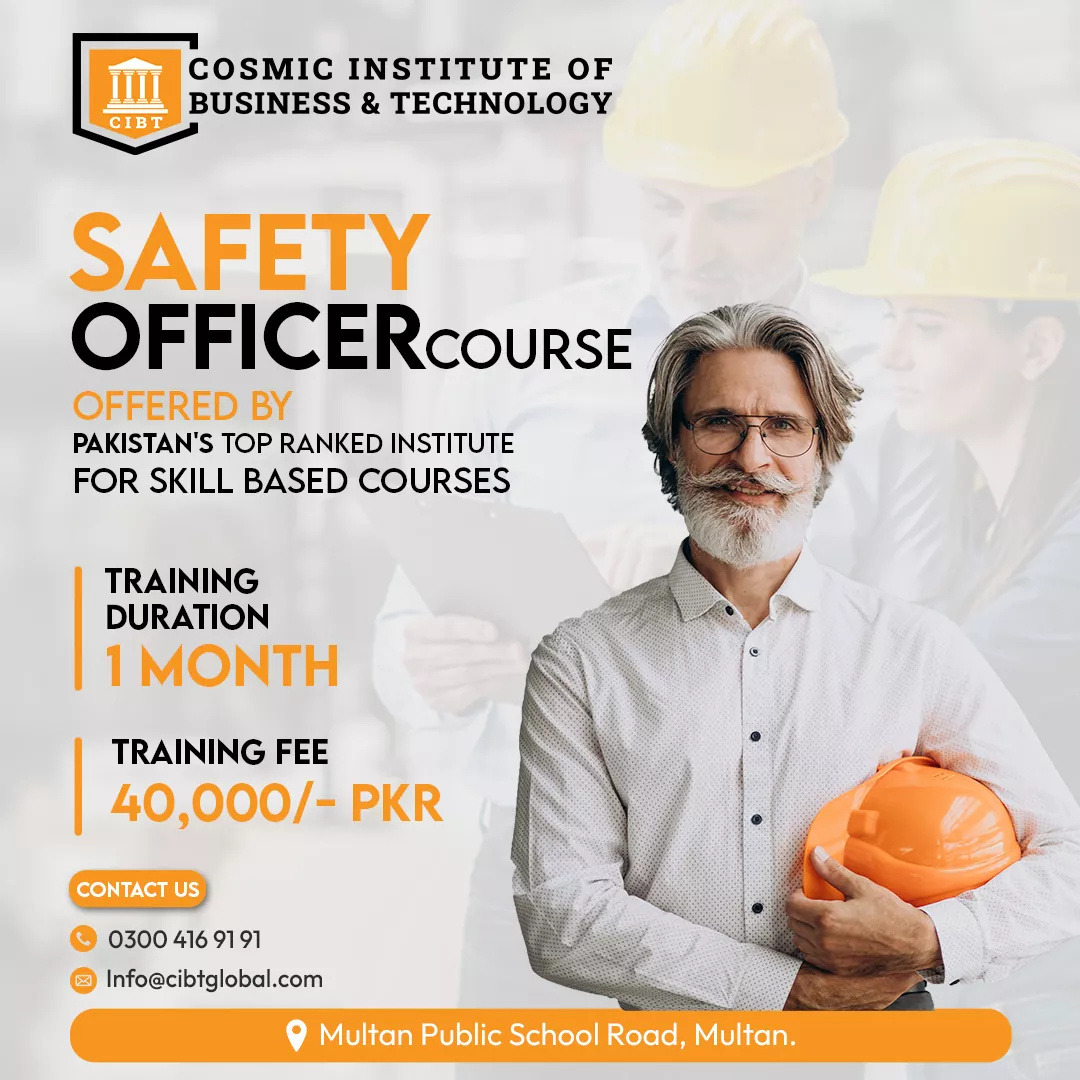Safety officers play a critical role in maintaining workplace safety. They prevent accidents and ensure compliance with safety regulations.
If you’re considering a career in safety, specialized courses can help. These courses provide essential knowledge and skills. You’ll learn about hazard identification, risk assessment, and safety management. Training programs often include both theoretical and practical components. This combination prepares you for real-world challenges.
Completing a safety officer course can boost your employability. Many industries require certified safety professionals. By investing in your education, you can make a significant impact on workplace safety. In this blog, we’ll explore various courses for aspiring safety officers. Discover how these programs can pave the way for a rewarding career in safety management.

Credit: www.linkedin.com
Introduction To Safety Officer Courses
Embarking on a career as a Safety Officer involves a dedication to ensuring a safe working environment. Safety Officer courses provide the fundamental knowledge and skills needed to protect workers and maintain compliance with safety regulations. These courses cover a wide range of topics, including risk management, hazard identification, and emergency response planning. Understanding these core areas helps safety officers to prevent accidents and create a safer workplace.
Importance Of Safety Training
Effective safety training is crucial for any organization. It reduces the risk of accidents and ensures compliance with safety standards. Trained safety officers can identify potential hazards and implement measures to mitigate them. This proactive approach helps to protect employees and reduce workplace injuries.
Organizations benefit from having trained safety officers as it promotes a culture of safety. Employees feel valued and secure, leading to improved morale and productivity. Safety training also helps in avoiding legal issues and financial losses associated with workplace accidents.
| Benefit of Safety Training | Impact on Workplace |
|---|---|
| Accident Prevention | Reduces workplace injuries |
| Compliance with Regulations | Avoids legal issues |
| Improved Employee Morale | Boosts productivity |
| Financial Savings | Lowers costs from accidents |
Career Growth Opportunities
The role of a Safety Officer offers numerous career growth opportunities. As organizations continue to prioritize workplace safety, the demand for qualified safety officers is rising. This demand translates into more job openings and higher salaries.
Safety officers can advance their careers by gaining additional certifications and experience. Specialized training in areas such as fire safety, hazardous materials management, or environmental safety can open doors to higher-level positions. Positions such as Safety Manager, Environmental Health and Safety (EHS) Director, or Compliance Officer offer increased responsibilities and higher compensation.
- Higher job demand
- Opportunities for specialized certifications
- Pathways to advanced roles
- Increased earning potential
Investing in safety officer courses is a smart decision for anyone interested in this field. It provides the foundational knowledge and opens up a world of career opportunities.
Key Responsibilities Of A Safety Officer
Being a safety officer involves many critical tasks. They play a crucial role in maintaining workplace safety. Their job ensures that everyone in the workplace is safe from potential hazards.
Risk Assessment
One of the primary responsibilities of a safety officer is risk assessment. They identify potential hazards in the workplace. They then evaluate the severity and likelihood of these risks. This helps in creating a safer environment for everyone. Safety officers also develop strategies to mitigate these risks. They ensure that all safety measures are in place and effective.
Compliance Management
Compliance management is another key responsibility of a safety officer. They ensure that the workplace adheres to all safety regulations and standards. This includes local, state, and federal laws. They also keep updated records of all safety inspections and compliance reports. This helps in preventing legal issues and maintaining a safe work environment.
Essential Skills For Safety Officers
Safety officers play a crucial role in ensuring workplace safety. They need various skills to perform their duties effectively. These skills help them identify risks, implement safety measures, and communicate effectively with others. Below are some essential skills every safety officer should have.
Communication Skills
Safety officers must communicate safety plans clearly. They should be able to explain complex safety protocols in simple terms. Effective communication helps them ensure everyone understands safety measures. This skill is important for training sessions and emergency situations. It also helps in documenting safety procedures and reporting incidents.
Problem-solving Abilities
Safety officers often face unexpected challenges. They need strong problem-solving abilities to address these issues. Identifying potential hazards and finding solutions is key. They must think quickly and make decisions that prevent accidents. This skill helps in creating a safer work environment. It also aids in developing preventive measures and conducting risk assessments.
Types Of Safety Officer Courses
Safety officers play a crucial role in maintaining a safe environment. To become a safety officer, one needs to complete specific courses. These courses provide the necessary knowledge and skills. They are designed for different levels of expertise. Let’s explore the types of safety officer courses available.
Basic Certification Courses
Basic certification courses are essential for entry-level safety officers. These courses cover fundamental safety principles. They provide a solid foundation in safety management.
- Occupational Safety and Health Administration (OSHA) 10-Hour Course: This course covers basic workplace safety standards.
- First Aid and CPR Certification: This certification is crucial for handling emergencies.
- Fire Safety Training: Learn essential fire safety measures and evacuation procedures.
Basic courses are typically shorter in duration. They are suitable for those new to the field.
Advanced Training Programs
Advanced training programs are designed for experienced safety officers. These courses cover advanced topics. They provide in-depth knowledge and specialized skills.
- NEBOSH International General Certificate (IGC): This course covers international safety standards. It is highly respected globally.
- Certified Safety Professional (CSP): This certification is for advanced safety professionals. It requires extensive experience and knowledge.
- Hazardous Materials Management (HAZMAT) Training: Learn about handling and managing hazardous materials safely.
Advanced programs often require prior experience or basic certifications. They are longer and more detailed. They prepare safety officers for higher responsibilities.
| Course Type | Duration | Target Audience |
|---|---|---|
| Basic Certification | Short-term | Entry-level |
| Advanced Training | Long-term | Experienced professionals |
Whether you are new or experienced, there’s a course for you. Choose the one that fits your needs. Enhance your skills and advance your career as a safety officer.
Top Institutions Offering Safety Courses
Are you aspiring to become a safety officer? Enrolling in a top-notch safety course can boost your career. This section highlights top institutions offering safety courses, ensuring you receive the best education and training available.
Reputable Universities
Many reputable universities offer comprehensive safety courses. Here are some institutions known for their excellence:
| University | Course Offered |
|---|---|
| University of California, Berkeley | Environmental Health and Safety |
| University of Houston | Occupational Safety and Health |
| Texas A&M University | Safety Engineering |
These universities offer specialized courses to ensure you gain deep knowledge in safety protocols and regulations.
Online Learning Platforms
Online learning platforms provide flexibility and convenience. Here are some popular platforms for safety courses:
- Coursera: Offers courses from top universities.
- Udemy: Features a variety of safety courses.
- edX: Provides courses from renowned institutions.
These platforms allow you to learn at your own pace. They offer a range of courses to suit different learning needs and schedules.

Credit: www.unifysolutions.com
Benefits Of Online Safety Courses
Online safety courses have become increasingly popular for individuals seeking to become safety officers. These courses offer numerous advantages, making them an ideal choice for those looking to enhance their skills and knowledge. Below, we explore some of the key benefits of enrolling in online safety courses.
Flexibility And Convenience
One of the biggest benefits of online safety courses is their flexibility. You can study at your own pace, fitting lessons around your schedule. This is perfect for busy professionals or those with family commitments.
Online courses also offer convenience. You can access course materials from anywhere with an internet connection. No need to travel to a classroom or adhere to a strict timetable.
| Benefit | Description |
|---|---|
| Study at Your Own Pace | Complete lessons when it suits you. |
| Access Anywhere | Learn from home or on the go. |
Access To Expert Instructors
Online safety courses provide access to expert instructors. These professionals bring valuable industry experience and knowledge.
You can interact with instructors through online forums, email, or video calls. This means you can get answers to your questions quickly and get guidance tailored to your needs.
In addition, many online courses offer guest lectures from industry leaders. This can provide unique insights and perspectives.
- Learn from experienced professionals.
- Get personalized guidance.
- Access guest lectures.
How To Choose The Right Course
Choosing the right course for a Safety Officer is crucial. It ensures you gain the necessary skills and knowledge. This decision impacts your career and safety practices. Let’s explore key factors to consider.
Evaluating Course Content
First, examine the course content. Ensure it covers essential topics:
- Health and Safety Laws: Learn about regulations and compliance.
- Risk Assessment: Understand how to identify and mitigate risks.
- Emergency Procedures: Gain knowledge in handling emergencies.
- Safety Management Systems: Study how to implement safety programs.
Review the syllabus in detail. Ensure it aligns with industry standards.
Considering Accreditation
Accreditation is key. It ensures the course is recognized and reputable. Look for:
| Accrediting Body | Significance |
|---|---|
| NEBOSH | Internationally recognized and respected. |
| IOSH | Offers a wide range of safety courses. |
| OSHA | Focuses on U.S. safety standards. |
Accreditation adds value to your qualifications. It increases job opportunities.
Success Stories Of Safety Officers
Completing courses for Safety Officers can open many doors. It’s not just about learning; it’s about changing lives. Let’s explore some inspiring success stories.
Career Advancement Examples
Many Safety Officers find new opportunities after taking courses. Here are some examples:
- John Smith – John started as a junior Safety Officer. After completing advanced courses, he was promoted to Safety Manager. He now leads a team of 10 people.
- Mary Johnson – Mary took specialized training in fire safety. She now works for a large corporation and advises on fire safety protocols.
- Robert Brown – Robert completed a course on workplace ergonomics. He transitioned to a consultant role, helping companies improve employee comfort and safety.
Impact On Workplace Safety
Safety Officers who complete courses make workplaces safer. Here are some real-life impacts:
- Reduced Accidents – Trained Safety Officers can identify and fix hazards. This reduces the number of workplace accidents.
- Improved Morale – Employees feel safer when they know a skilled Safety Officer is on-site. This leads to higher job satisfaction.
- Compliance with Regulations – Knowledgeable Safety Officers ensure that workplaces comply with safety regulations. This avoids fines and legal issues.
These success stories show the value of Safety Officer courses. They lead to career growth and safer workplaces. Investing in these courses can make a big difference.

Credit: archive.org
Frequently Asked Questions
What Qualifications Do Safety Officers Need?
Safety officers typically need a degree in occupational health and safety, or a related field. Certifications like NEBOSH, OSHA, or IOSH are also highly valued.
How Long Does It Take To Become A Safety Officer?
It usually takes 2-4 years to become a safety officer. This includes obtaining a relevant degree and certifications.
Are Online Safety Officer Courses Effective?
Yes, online safety officer courses are effective. They offer flexibility and comprehensive content, covering essential safety protocols and regulations.
What Skills Are Essential For Safety Officers?
Key skills for safety officers include attention to detail, strong communication, problem-solving, and knowledge of safety regulations and best practices.
Conclusion
Safety officer courses are essential for a successful career in safety. These courses equip you with vital skills and knowledge. You can choose from many options to fit your needs. Start your journey to becoming a safety officer today. Investing in education ensures a safer workplace.
Stay ahead by continually learning and improving your skills. Make safety a priority. The right course can set you on the path to success. Choose wisely, study hard, and embrace your future as a safety professional.



